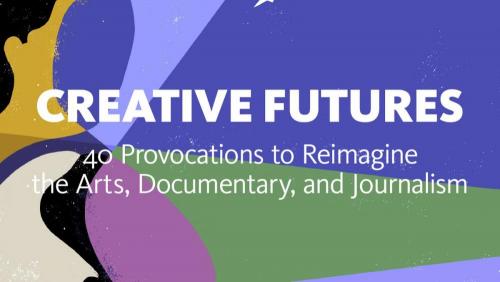
https://www.fordfoundation.org/campaigns/creative-futures/
We stand at a historic crossroads: a social, racial, and economic reckoning laid bare by COVID-19 and a movement for Black lives. It is a moment that demands interpretation and action. Cultural narratives are central to shaping our realities, including how best to ensure justice and equity for all. So how do we grow and change our systems of arts and media—systems, like our larger society, that have never been equitable or sustainable? CREATIVE FUTURES is a reimagining of the fields of arts and culture, documentary film, and journalism, a set of concrete action plans to fuel and shape the transformative possibilities to come. In the words of abolitionist scholar Ruth Wilson Gilmore, “What the world will become already exists in fragments and pieces, experiments and possibilities.” Here are some of those fragments and pieces, experiments and possibilities.
ABOUT THIS PROJECT
From Past to Present: How Artists Build from the Past to Shape our Future
By Margaret Morton, Program Director
Illustrations by Sawsan Chalabi
PROVOCATIONS
Artmaking
Artmaking as listening. As call and response. As connection. As community. As ideas. As medicine and healing. As love. As liberation. As America itself. These provocations explore the future of artmaking. The writers call for Black, indigenous, people of color, and disability leadership, for equity over inclusion, for intersectional aesthetics. They resist the idea of “new” art that serves whimsical curatorial and funding agendas while neglecting structural change. They embrace artwork grounded in history, bodies, place, and customs that reveal practices of injustice. They implore us to act, to move from questions of “how” to statements of “when.” When Black or Latinx composers comprise at least 10 percent of programming at every orchestra in America. When disability itself takes the stage. When art and cultural organizations lead our post-pandemic reintegration. When artists help create solutions to the country’s hardest problems and are paid equitably and transparently.
Contributing Writers
Aaron Dworkin, Alberto B. Mendoza, Alice Sheppard, Alissa Quart, Ana Serrano, Angie Kim, Aruna D’Souza, Brett Story, Carlton Turner, Carrie Lozano, Chris E. Vargas, Coco Fusco, Craig Santos Perez, Dark Study, Don Young, Emily Ladau, Grace Lee, Heather Chaplin, Imara Jones, Iyabo Boyd, Jenni Monet, Jess Devaney, Lam Thuy Vo, Las Imaginistas, Lewis Raven Wallace, Louis Massiah, Luisa Dantas, Marc Bamuthi Joseph, Maria Hinojosa, Maribel Alvarez, Matt Thompson, Mazin Sidahmed, Mutale Nkonde, Natalia Almada, New Negress Film Society, New Red Order, Patty Berne (interviewed by Bianca Laureano), Postcommodity, Shaun Leonardo, Sofía Gallisá Muriente, Sonya Childress, Taylor Aldridge, Teddy Dorsette III, and Thelma Golden
Editorial Team
Lawrence-Minh Bùi Davis, Curator, Smithsonian Asian Pacific American Center
Lena Sze, Program Associate, Creativity and Free Expression, Ford Foundation
Theo Torre de Castro, Program Assistant, Ford Foundation
Chi-hui Yang, Senior Program Officer, JustFilms, Creativity and Free Expression, Ford Foundation
















Add new comment